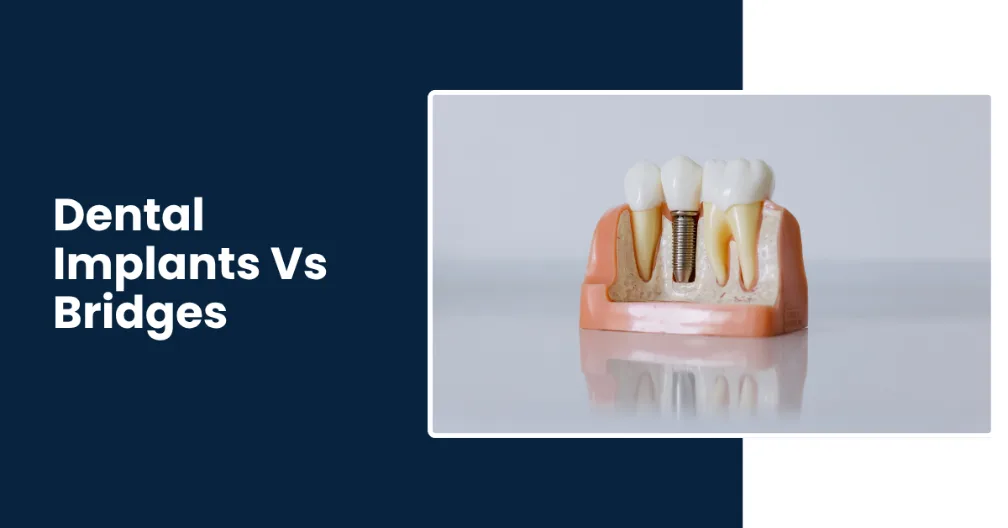If you are missing one or more teeth, the best options to fill that gap are dental implants and bridges. Both restorative treatments improve chewing, speech, and confidence, but they differ in several important ways.
In this guide, we explain the differences between the two, including procedure, benefits, drawbacks, and cost, so you can make an informed decision about your oral health.
Key Differences Between Dental Implants and Bridges
Both treatments replace missing teeth, but the approach and longevity vary.

Treatment and Procedure
A dental implant is a small titanium post surgically placed into the jawbone under local anaesthesia. It replaces the natural tooth root and fuses with the bone through osseointegration, creating a strong, stable base for the crown. Once healing is complete, an abutment and crown are attached, restoring a natural look and function.
A dental bridge is a non-surgical option. It anchors to the natural teeth on either side of the gap. The dentist takes an impression or digital scan to design the replacement tooth. While the permanent bridge is being prepared, a temporary one is fitted. During placement, the supporting teeth are slightly reshaped, and the final bridge with crowns is cemented in position.
Your bone density and gum health determine which treatment fits best. In some cases, bone grafting or periodontal therapy may be required before implant placement.
Pros and Cons of Dental Implants vs Bridges
Implant Pros
- Prevents jawbone resorption and bone loss
- Keeps adjacent teeth intact
- Provides strong bite stability
- Can last for decades with good oral hygiene
Implant Cons
- Higher upfront cost
- Requires minor surgery
- Healing time may extend over several months
Dental Bridge Pros
- Non-surgical procedure
- Faster treatment timeline
- Lower initial cost
- Often covered by insurance plans
Dental Bridge Cons
- Involves filing healthy teeth
- Does not stop bone loss
- Usually needs replacement after 10–15 years
Dental Implants vs Bridges Maintenance
Both options require consistent oral hygiene, but upkeep differs slightly.
Implants are easier to maintain because they can be brushed and flossed like natural teeth. Using a soft-bristled toothbrush and non-abrasive toothpaste helps protect the crown’s surface.
Bridges require extra care, as food particles can accumulate beneath the false tooth. Specialised floss or interdental brushes remove debris and prevent decay around the supporting teeth. Regular checkups allow your dentist to monitor periodontal support and gum health.
Longevity of Dental Implants vs Bridges
Proper care significantly impacts the longevity of each restoration. Implants, supported by healthy bone and gums, can last more than 20 years or even a lifetime.
Bridges typically last 7 to 15 years, depending on oral hygiene and the condition of surrounding teeth. If decay or gum changes occur, replacement may be necessary.
Dental Bridges vs Implant Cost
Implants are generally more expensive because they involve surgery, premium materials, and multiple visits. A single implant can cost around $5,000 or more, while bridges usually range between $500 and $1,500 per tooth.
Insurance coverage also differs. Some plans cover only part of the implant restoration, such as the crown or abutment. It is best to confirm with your provider before starting treatment.
Dental Implants vs Bridges: Which Is Better?
From a health standpoint, implants offer better long-term outcomes because they preserve bone and gum structure. Bridges, however, are quicker, less invasive, and more affordable, making them ideal for patients with limited bone density or specific health conditions.
The best choice depends on your jawbone strength, gum health, and financial plan. What works for one person may not be right for another, so professional evaluation is key.
Both dental implants and bridges improve comfort, appearance, and daily function. If you want faster, lower-cost treatment, bridges are practical. If you prefer long-term stability, bone preservation, and a natural look, implants are the stronger choice.
Related Guides:
- What Type of Dentist Does Dental Implants?
- How Long Does It Take to Get a Dental Implant?
- How to Take Care of a New Dental Bridge
FAQs
Which is better, a bridge or an implant?
Implants last longer and preserve bone health, while bridges are quicker and more budget-friendly. The right option depends on your oral condition and goals.
Which is safer, an implant or a bridge?
Both are safe when performed by a qualified dentist. Implants require surgery, while bridges involve preparing nearby teeth.
Which is more painful, a bridge or an implant?
Implant placement is a surgical procedure, but performed under anaesthesia, so pain is minimal. Recovery discomfort usually fades within a few days.
Do teeth decay under a bridge?
Yes. If plaque collects around the supporting teeth, decay can develop. Regular cleaning and professional checkups prevent this.
Who is a good candidate for a bridge?
Anyone with healthy gums and strong neighbouring teeth can consider a bridge for single or multiple missing teeth.

